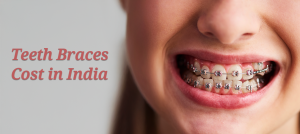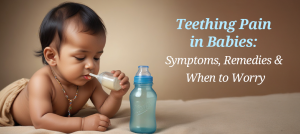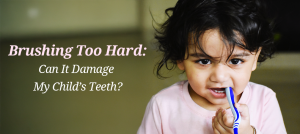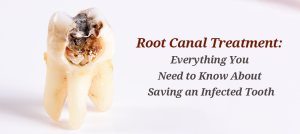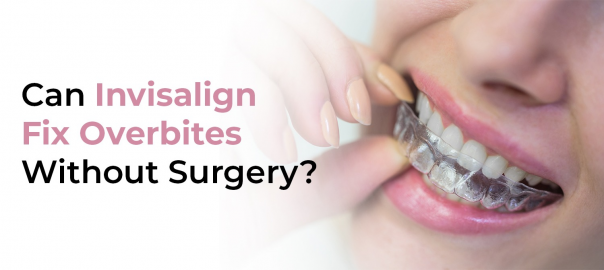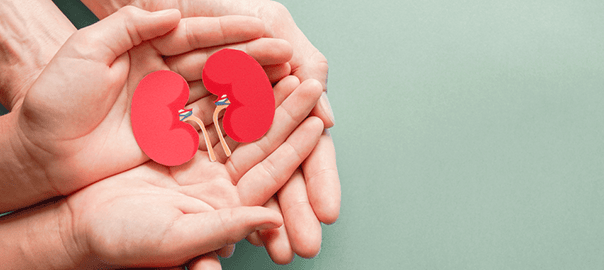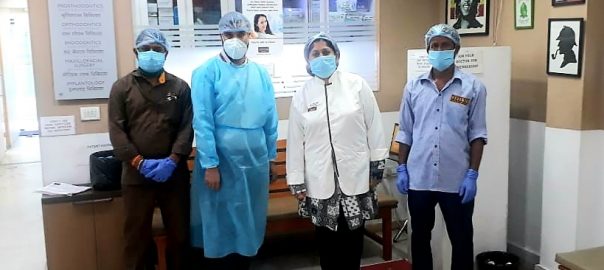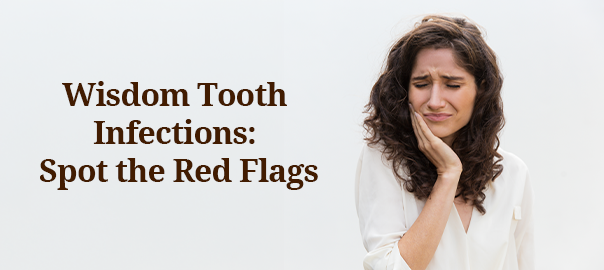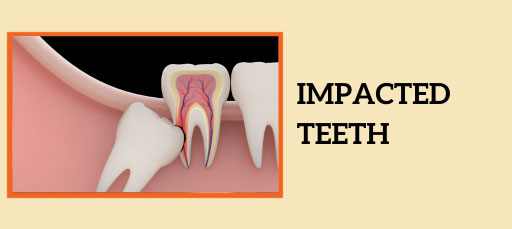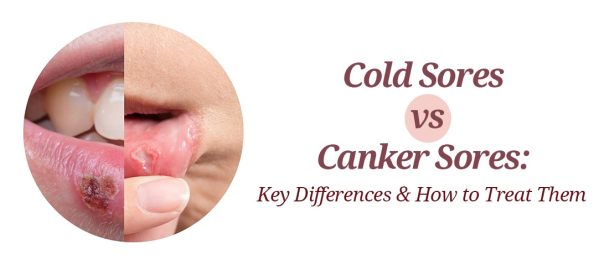
Cold Sores vs. Canker Sores: Key Differences & How to Treat Them
Cold sores and canker sores may appear alike at first, but they are completely different conditions with unique causes, symptoms, and treatments.
Understanding the difference is essential for correct management & good oral hygiene maintenance.
Let’s dive deep into what sets them apart and how you can address them.
What Are Cold Sores?
Cold sores, also known as fever blisters, are small, fluid-filled blisters that usually appear on or near the lips.
The main causative agent for fever sores is herpes simplex virus (HSV).
The virus enters the body but remains inactive until it is stimulated by stress, diseases, or ultraviolet rays.
Cold Sore Symptoms
- Tingling or Itching is the initial sign of the appearance of a probable cold sore.
- Fluid-filled bubbles, known as blisters appear around the lips, nose, or chin. These appear as recurrent clusters, most commonly at the corner of mouth.
- Crusting: Once the blisters begin to rupture to produce a scab, they eventually heal.
- Additionally, in a few cases, these are accompanied by fever, swelling of the lymph nodes, sore throat, and overall unease.
DID YOU KNOW?
It is also commonly seen to appear in females in sync with their menstrual cycles, they follow the same cyclic pattern.
Are Cold Sores Contagious?
Cold sores are highly contagious. Infection spreads either by:
– direct contact, such as kissing or
– through other materials like sharing utensils or towels with an infected person.
What Are Canker Sores?
These are tiny, superficial ulcers. Always seen to develop inside the mouth, either on tongue, gums or inner cheeks.
Canker sores are not caused by a virus and are also not contagious.
Common Triggers for Canker Sores Development:
- Their development may be influenced by high levels of stress.
- Trauma caused by accidental bites, sharp objects, or injuries from poorly fitting dental appliances.
- Foods that are hot or acidic might irritate the lining of the mouth.
- Nutritional Shortfalls: insufficient iron, zinc, folate, or vitamin B12.
Symptoms of Canker Sores:
- Appearance: Round, white or yellow ulcers with a red border.
- Pain: Particularly noticeable while eating, drinking, or speaking.
- Size: Typically small but can occasionally be larger in severe cases.
Cold Sore vs Canker Sore
| Feature | Cold Sores | Canker Sores |
|---|---|---|
| Cause | Herpes Simplex Virus (HSV-1) | Stress, injury, or dietary factors |
| Location | Outside the mouth (lips, chin, nose) | Inside the mouth (gums, cheeks) |
| Contagious? | Yes | No |
| Appearance | Fluid-filled blisters | Flat ulcers with a red border |
Symptoms to Watch For
Awareness of how each will help you know how to spot them and what to do with each:
| Cold Sore Symptoms | Canker Sore Symptoms |
|---|---|
| Tingling or burning sensation before blisters form. | Round, white or yellow sores with a red outline. |
| Blisters that burst and crust over. | Painful ulcers that can make eating or speaking difficult. |
| Pain and swelling around the affected area. | Usually solitary sores at a site without accompanying fever. |
| Clusters of small, fluid-filled vesicles may be accompanied by fever and other viral symptoms. |
Treatment Options:
Cold Sores
The cold sore fades in 7-10 days but its treatments is suggested in order to deal with the symptoms that present along with the rapid healing of the herpes:
- Over-the-Counter Remedies: Systemic antivirals along with pain-relieving gels to ease discomfort.
- Prescription Medications: Antiviral drugs for severe cases, upon professional consultation.
- Home Remedies: Apply a cold compress to reduce swelling. Avoiding triggers like sun exposure and stress.
Canker Sores
These are also seen to heal on their own within 1-2 weeks, but these remedies can reduce pain and promote healing:
- Rinses: Antimicrobial/Anaesthetic mouthwashes to reduce irritation.
- Topical Treatments: Gels containing benzocaine or other pain relievers.
- Dietary Adjustments: Avoid spicy, acidic, or tough foods that could aggravate the sores.
While there are over-the-counter medications available for easing pain & symptoms, it’s always suggested to consult with a professional before consuming them.
Prevention Tips for Both
While it’s impossible to prevent these sores entirely, you can reduce their frequency and severity:
For Cold Sores
- Avoid direct contact with an identified infected individual.
- Use lip balms containing SPF in the sun.
- Follow relaxation techniques. Stress management helps.
For Canker Sores
- Always try having a balanced diet rich in vitamins and minerals.
- Practice good oral hygiene to prevent irritation.
- Avoid food items that cause or trigger ulcers.
When to Visit a Dentist
Almost all cold sores and canker sores are self healing in nature. But there are few situations which may require the need for underdoing professional care:
- Sores that do not resolve in two weeks.
- Severe pain or difficulty of eating and drinking.
- Frequently reappearing sores.
- Evidence of infection such as fever or inflammation.
- Also, recurring or non healing cyclic ulcers in or around the mouth may be an indicative of underlying systemic disease. It is recommended to consult with a healthcare professional to further understand the situation.
The experts at Clove Dental have been trained to diagnose your condition and understand its underlying causes and triggers in order to formulate solutions tailored just for you.
Just search for “Dentist Near Me” and we’ll pop up ready to tackle all your stresses for you!
FAQs
1. Are cold sores and canker sore the same?
No, cold sores and canker sores vary in many parameters. The major distinguishing ones being:
- Cold sores are infectious and caused by a virus.
- Canker sores are non infectious ulcers whose appearance is triggered by different factors.
2. How long do cold sores remain?
Cold sores generally last 7-10 days but may take longer to heal if untreated.
3. Is it okay to kiss someone if I have a cold sore infection?
Do not kiss and share utensils when an outbreak is seen to prevent the spread of the virus.
4. What can I do to promote the healing of canker sores in mouth?
Utilize topical analgesics, rinse with saline solution, and steer clear of aggravating foods.
5. When is it necessary to get medical assistance for mouth sores?
Consult a dentist if sores last more than two weeks, are exceptionally large, or result in intense pain.
A healthy mouth signifies happiness, and recognizing the distinction between cold sores and canker sores is the initial step toward appropriate care.
If you have ongoing or painful sores, contact Clove Dental for professional guidance and care. Allow us to assist you in maintaining a healthy and pain-free smile!
By- Dr. Shreya Singh
Leave a Reply
Leave a Reply
POPULAR POST







